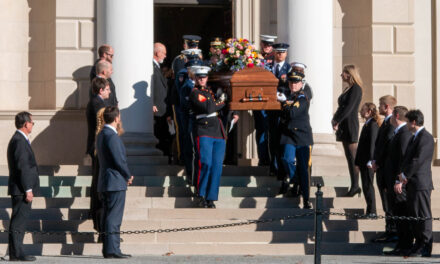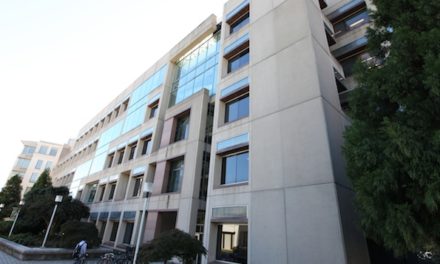University President James W. Wagner received the Anti-Defamation League (ADL) Stuart Lewengrub Torch of Liberty award at the Community of Respect Centennial Anniversary Dinner on Tuesday.
The ADL is a civil rights group that aims to end anti-Semitism and other forms of bigotry. According to its website, the qualifications for an individual or company to receive the award include demonstrating qualities that promote respect and fair treatment in the community.
Wagner received the award for his “dedicated efforts to revisit and correct injustices that have been a stain on the University’s proud history,” including the University’s statement of “regret” for its historical involvement in slavery and an apology for Emory’s anti-Semitic past at the now-defunct Emory School of Dentistry, according to the ADL. Atlanta Mayor Kasim Reed and former United States Ambassador Stuart Eizenstat were also recognized at the ceremony, receiving the Abe Goldstein Human Relations Award and the ADL Centennial Achievement award, respectively.
However, Wagner said at the awards ceremony that he was at first hesitant to receive the award.
“Some of you might think I might be hesitant to accept this because of my racially insensitive blunder last winter that brought embarrassment to Emory,” Wagner said. “Mine was an action that can only be forgiven, and many have graciously forgiven me.”
Former Emory Board of Trustees Chair Ben F. Johnson III (’65C), who presented the award to Wagner at the dinner, said at the event, “While [Wagner] was leading Emory into the future, there were things in Emory’s past that had nothing to do with him that had to be addressed. Two examples stand out.”
The first occurred in late 2010. As Emory approached its 175th anniversary, Wagner and the Board of Trustees adopted a resolution stating that it “regrets” Emory’s association with the institution of slavery and the long delay of its acknowledgement.
Harvard University underwent a similar process a year later, in part because of Emory’s acknowledgement, Johnson said.
“As Emory moves forward, it seeks the wisdom always to discern what is right and the courage to abide by its mission of using knowledge to serve humanity,” Johnson said. “[Wagner] showed that speaking up for what is right can be contagious.”
Johnson said the second example refers to an incident in the now-defunct Emory School of Dentistry during the 1940s to 1960s. During Dean John Buhler’s tenure, 64 percent of the Jewish students in the school were forced to repeat work or were failed by their professors due to pressure from Buhler.
When these allegations were brought forth, the dean of the dental school resigned and “that was that,” Johnson said.
For 60 years, Emory neither acknowledged discrimination nor expressed remorse for its actions.
However, in fall 2012 Perry Brickman (’51C), a former Emory dental student who failed out, released a documentary about the dental school incident, prompting Wagner to issue a formal acknowledgement.
“We need to be fearless in confronting our past as individuals and as an institution,” Wagner said. “There are often things we regret about our past, but there is the possibility of seeking amends and building on acknowledgement of those things.”
In a video interview with the ADL, Wagner said he felt it was important to join the ranks of award recipients who pledge to be allies in the fight to end hate and discrimination.
“I’m pleased with the way in modern parlance ‘ally’ has come to mean colleague,” Wagner said. “Real power and real change comes from understanding what we have in common and can embrace together to fight hate.”
In October 2012, Wagner held a meeting with some former Jewish students affected by the discrimination as well as a private screening of the documentary.
“[Wagner] is a good and great man who I am privileged to call my friend,” Johnson said. “He has made and continues to make Emory a force for good and leads us into a brighter future while he reconciles us with our past.”
Wagner said he felt honored to receive the award, especially on behalf of Emory.
“Emory’s more recent history has been punctuated with efforts to secure justice and fair treatment,” Wagner said. “In the 1990s, Emory had been an early adopter for health benefits for same-sex domestic partners, and in the 1960s Emory went to [the Georgia Supreme Court] to ensure private schools could integrate without facing penalties.”
He also referred to controversial comments that he made in Emory Magazine about the three-fifths compromise last spring.
These remarks incited backlash among students, particularly the student movement #EmoryCuts.
“While we laud the University’s acknowledgment of the unacceptable anti-Semitism at the dental school, we wish that Wagner’s own administration would be more transparent in its contemporary dealings and decisions, particularly when they involve delicate questions of race and community impact,” said Patrick Blanchfield, Laney Graduate School Ph.D. candidate and #EmoryCuts representative. Wagner said his hesitation in receiving the award stemmed from a lack of complete understanding about the ADL and the concept of anti-defamation.
“I have learned important lessons about intellectual and cultural humility, the risks of drawing quick and potentially hurtful conclusions, and I was committed to do a more thorough job of research,” Wagner said. “What I’ve learned is that sometimes the best way to build conviction in what is good is to expose and be convicting of that which is bad.”
Blanchfield added that while #EmoryCuts “respects the ADL,” the group “questions its judgment and certainly rejects the University’s crass leveraging of that award to rehabilitate [Wagner’s] thoroughly compromised reputation.”
– By Stephen Fowler and Rupsha Basu
Read our staff editorial on this subject here.
Stephen Fowler 16C is the political reporter at Georgia Public Broadcasting, the statewide NPR affiliate in Georgia. He graduated from Emory with a degree in Interdisciplinary Studies and covered the central administration and Greek Life for the Wheel before serving as assistant news editor, Emory Life editor and the Executive Digital Editor from 2015-16.






Maybe you enjoy to study and possess hardly any requirement for marketing and advertising a small business,Burberry Factory. No matter, no matter what Private label rights Ebooks may benefit you.
Rippln quickly became not only a company but a movement with a lot of eyeballs,
influence and power, that’s why so many fortune 500 companies are knocking on
Rippln’s door consistently. So you have finally reached level
33 in Candy Crush and now you are stuck. The next level that gave me
some issues in the Candy Crush Saga game would be level 65.
Whiten accomplished the feat wjile playing for thhe St. Game Tester job openings are abundant currently, because the
fact that gaming market is thriving. And if you just like to one-up all your gaming friends in
water cooler-rivalry, go for 15 or more.
We attempted to get an explanation from the page owner,
butt was unable to. Through a good Facebook contest app, you can encoureage viral marketing with a points system.
When you’ve pent a good deal of time preparing
yoyr ad and setting up your landing page, it’s very disheaftening to then have your ad disapproved.
Deliver increased pleasures for customers. Drive increased traffic aimed at your web. Rewrite the actual content articles in addition to distribute to internet websites for your own personal websites.
Hollywood star Will Smith is reportedly not returning to the sequel of his hit sci-fi film ‘Independence Day’. It is rumoured that the 45-year-old actor will not be reprising his role as Captain Steven Hiller in the sequel that has been titled ‘ID Forever
You may play this sports drinking gasme at home with your friens or when you are out in a bar drinking while
watching a game.Since the game play can offten be very different,
the informaion is also correspondingly diverse. Jimmy loves to rave on topics like video
games, make a RPG game, summer camps annd much more.
I really love your website.. Pleasant colors & theme.
Did you build this website yourself? Please reply back as I’m trying to
create my own website and would love to know where you got this from or
exactly what the theme is named. Thanks!